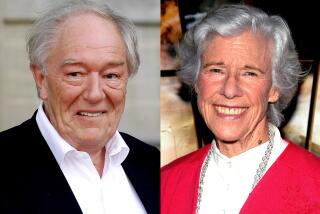‘Nasty Little Secrets’ Broadens Joe Orton’s Biography Bazaar
- Share via
PHILADELPHIA — The times have caught up with playwright Joe Orton. Neglected if not forgotten since his lurid murder 20 years ago, Orton has been rediscovered with a flourish. His movie biography, “Prick Up Your Ears,” has just been released. His diaries have just been published. And now we have a biographical stage play, “Nasty Little Secrets.”
Lanie Robertson’s drama concluded its premiere run here Sunday at the 178-year-old Walnut Street Theatre. But it’s sure to broaden the Ortonesque bazaar once the word gets around.
Like the film, the play focuses on the anarchy of two outsiders: the raw, talented Orton and his older homosexual mentor/lover, Kenneth Halliwell. Unlike the film, the play incorporates a fictitious music-hall section to capture the frenetic disintegration and absurd surprise of Orton’s own plays.
The play also does a better job filling in the pair’s socially barren but mutually productive years (1952-63), before a disastrous caper spirited them to prison for defacing library books. That incarceration, dramatized in quick flashes by director Stuart Ross, liberated the spunky and adaptable Orton, but broke the fragile and insecure Halliwell.
Actor Simon Brooking gives the working-class Orton more pluck than arrogance. It’s a nice distinction. Here Orton’s notorious “trolling” begins as a brash declaration about having sex with “every man, woman, child--cats and little dogs--in the whole world.”
Actor Craig Fols turns the shrill and mannered Halliwell into a character far more empathic than his film counterpart. It’s possible to see in this play why Orton, flush with overnight success, stuck with his loutish lover. Maybe it was loyalty or love and hate. More likely it was habit.
The play’s social structure is trimly divided between nonconformists Orton/Halliwell and two powers-that-be from mainstream society.
One is Orton’s literary agent, amoral and callow to the bone. He’s a sharp contrast to the sympathizing, female character in “Prick Up Your Ears.” (The agent was unctuously played by Walnut Theatre veteran Robin Chadwick, who twice forgot his lines and alarmingly shot an arm into the air, yelling “Line! Line!”)
The other mainstream character is a raspy, scruffy police inspector, played by Walnut regular Douglas Wing. His monologues are the play’s weakest feature.
Orton’s murder on Aug. 9, 1967, is re-created, noiseless and unseen. A hammer-wielding Halliwell, jealous and rejected, flings himself behind a curtain encircling the sleeping Orton. Harrowing seconds pass. Halliwell emerges, partially disrobes, pops a handful of pills and sputters to the floor. He died, the inspector tells us, in 18 seconds.
An anticlimactic scene shows the pair ascending to heaven via a rope ladder which drops from the flies--an inside reference to a rope ladder which falls at the very end of Orton’s “What the Butler Saw.” This fantasy scene attempts to combine Orton’s personal signature with the lovers’ shared weight of experience, but it’s too precious .
What lingers is a psychologically riveting drama propelled by some of the hard wit and anarchic pace characteristic of Orton’s three major works, “Entertaining Mr. Sloane,” “Loot” and “What the Butler Saw.”
Besides the currently playing “Loot” at the Tiffany (see accompanying review), the Mark Taper Forum this summer will stage major repertory productions of “Entertaining Mr. Sloane” and “Loot.”
Joe Papp is also reportedly preparing a theatrical version of Orton’s unproduced screenplay about the early Beatles, “Up Against It,” to star Philadelphia-area rocker Todd Rundgren.
Orton has become something of a transatlantic galaxy. It’s a rut he would have relished.
More to Read
The biggest entertainment stories
Get our big stories about Hollywood, film, television, music, arts, culture and more right in your inbox as soon as they publish.
You may occasionally receive promotional content from the Los Angeles Times.










